
Editor’s Note: Find all of The Atlantic’s “Best of 2022” coverage here.
Television has always been a tether—to other people and to ourselves. In 2022, a year of turmoil and uncertainty, TV has provided something even more essential: a lifeline. Some shows reflected the moment’s surreality back to us. Some made us see other people in slightly new ways. Some offered escapism through larger-than-life story lines. At their best, the TV shows of 2022 revealed human truths through fiction. They made us laugh. They made us think. They offered some refuge from the storm.
The list below highlights the series—melodramas, drama-dramas, comedies—that helped us. These shows satirized the cramped-togetherness of the workplace and transported us to beautifully realized alternate worlds. They took us to sterile offices and gaudy resorts, to kitchens and cattle ranches and pirate ships. They provoked; they entranced; they explained. Above all, they helped bring a bit of order to a year of chaos, one enthralling episode at a time.
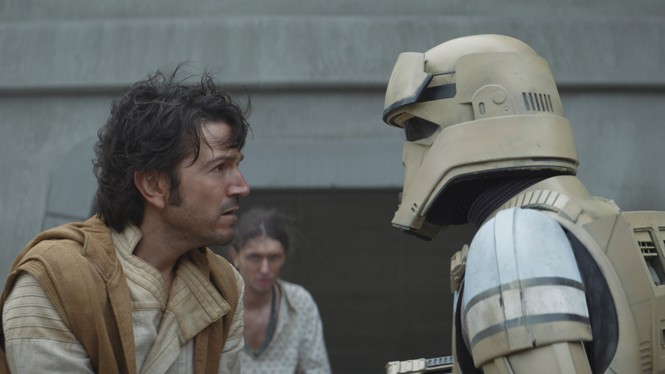
Andor (Disney+)
A Star Wars show without lightsabers, Jedi knights, Sith lords, or familiar Force-wielding faces of any kind, pint-size or otherwise? What a relief. The writer Tony Gilroy’s endeavor is a refreshing reminder that uncharted storytelling territory remains in a universe as well-known as the one George Lucas created. Andor, which tracks how Rogue One’s Cassian Andor (played by Diego Luna) evolves from ordinary person to Rebel captain, understands that watching someone discover his purpose can be as exciting as observing the discovery of a new planet. Still, the show isn’t lacking in jaw-dropping action: Cassian’s journey involves high-octane missions stretching across the galaxy, as well as electrifying monologues from actors such as Stellan Skarsgård, Fiona Shaw, and Andy Serkis. Andor’s sixth episode is particularly riveting. No offense to Baby Yoda, but nothing he’s done has ever made me leap to my feet and cheer at my screen. — Shirley Li
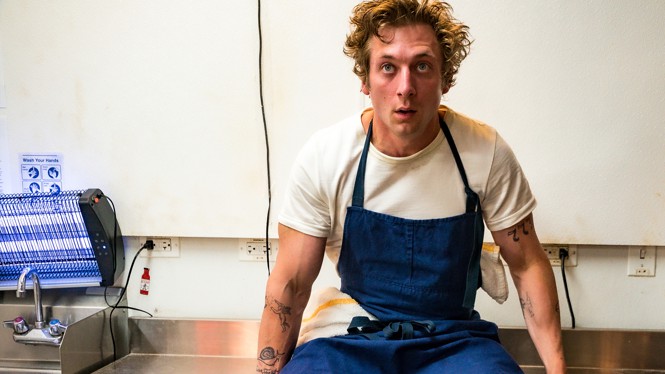
The Bear (FX)
On July 25, The New Yorker ran a cartoon featuring an anxious-looking man and a rumpled, moon-eyed woman in bed together with the caption “So … what was all that ‘Yes, Chef’ stuff about?” Obviously, it was about The Bear, Christopher Storer’s barnstorming dramedy about a chef who quits high-end restaurants to sling sandwiches back home in Chicago after the death of his brother. Trying to identify exactly what makes the show so compelling is a tricky endeavor: Its pace is frenetic, its plot is completely anxiety-inducing, and its re-creation of the dynamics of food service is intensely committed. But The Bear is also thrilling, funny, beautifully rendered, and sharp about how hierarchical workplaces can prize obeisance over potential and aggression over achievement. Without these kinds of structures in place, the show wonders, what might be possible? Finessing Italian beef, one imagines, is just the beginning. — Sophie Gilbert
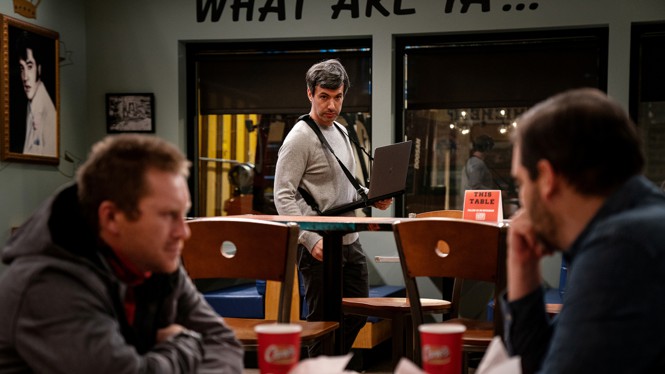
The Rehearsal (HBO Max)
The Rehearsal is a meta-documentary and melodrama and meditation on the extremely human desire to control the uncontrollable. It is also—and I mean this as a high compliment—profoundly weird. Its premise: The comedian Nathan Fielder, the show’s creator and star, guides people who are preparing for big events in their lives by helping them act out those moments in advance, with professional actors and custom-made sets. They will rehearse the future so thoroughly, the logic goes, that they will change its course. Fielder’s attempts to direct reality descend into ever-more-dizzying absurdity, with ever-larger casts, ever-wider stages, and ever-more-complicated props. (One of the latter is an animatronic infant, acquired to help a woman who is deciding whether she wants to become a mother. Its nightly wails are cued by Fielder.) The show could be read as a glib intellectual exercise; instead, it is a poignant one. The Rehearsal’s flawed promise is also its punch line: Try as we might, life cannot be stage-managed. — Megan Garber
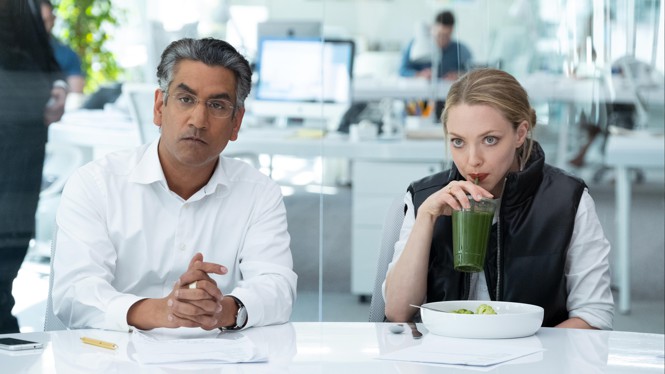
The Dropout (Hulu)
In a year overstuffed with ripped-from-the-headlines shows about notorious frauds, only Hulu’s dissection of Elizabeth Holmes, the disgraced founder and CEO of the blood-testing start-up Theranos, truly stands out. The series is needle-sharp in pinpointing the complex factors contributing to Holmes’s rise and fall, but it’s also surprisingly funny as it traces the absurdity of early 2000s tech culture and then-ubiquitous girl-boss mentality. Amanda Seyfried’s Emmy-winning performance is so tremendous that she’s become the definitive Holmes; Jennifer Lawrence decided against pursuing her turn at the role after watching the show. Most projects about scammers focus heavily on re-creating the salacious elements of their story, but great ones understand that the consequences of those betrayals require just as much examination. As The Dropout makes clear, Holmes was never actually a star—neither genius nor visionary. She was just someone who knew how to dazzle the right marks. — SL
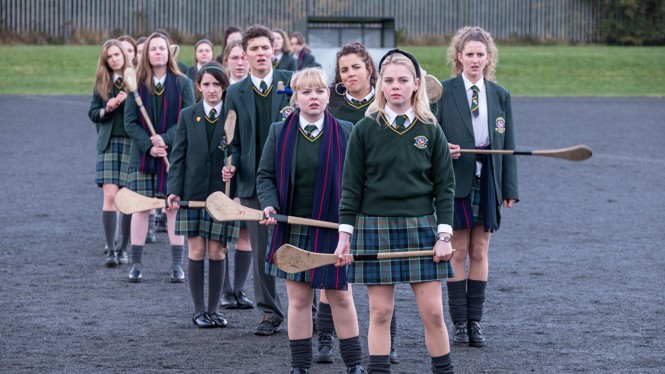
Derry Girls (Netflix)
This year, Lisa McGee’s sitcom about a group of friends growing up in ’90s Northern Ireland amid the Troubles solidified its place among the best coming-of-age comedies of all time. In the final season, Erin, Orla, Clare, Michelle, and their “wee English fella,” James, begin to embrace the uncertainties of adulthood, a subtle shift that proves that Derry Girls has never been merely about the trials of getting older. It is also about the acceptance and compromise that come with being more mature—as well as the humor inherent in learning such lessons, however long it takes. The show has always been capable of being silly and stirring at once, but these final episodes come with a weightlessness even at the season’s heaviest moments. That balance—of being sweet but not saccharine, rowdy but not ridiculous—makes the show, as the girls themselves would say, absolutely “cracker.” — SL
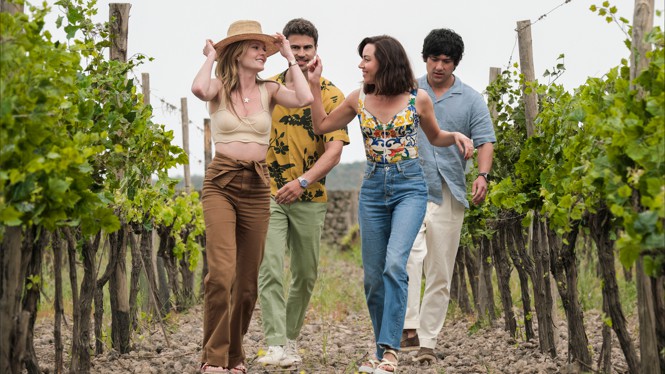
The White Lotus (HBO Max)
One of the selling points of a luxury resort is its offer of endless options: the fun of the beach, the pampering of the spa, the adventures of the surrounding town, the teeming indulgence of the morning buffet. The White Lotus mimics that abundance. Mike White’s show, which recently aired its second season, is drama, dark comedy, thriller, murder mystery, and camp. It does not merely toggle among its genres, swerving between humor and horror as so many shows do; it merges them seamlessly. The vacationers at the White Lotus in Sicily, and the resort workers who cater to their whims, are at once ridiculous and heart-wrenching. Couples arrive and leave with their secrets; feuding families try to reconcile and only somewhat succeed. Their stories are simple and complicated. If you asked me what The White Lotus is about, I’d have a hard time answering, because it’s about so much: money, class, love, sex, murder, greed, freedom, fate. But the show makes those themes coherent and, in the process, achieves what any successful getaway does: It keeps the travelers wanting more. — MG
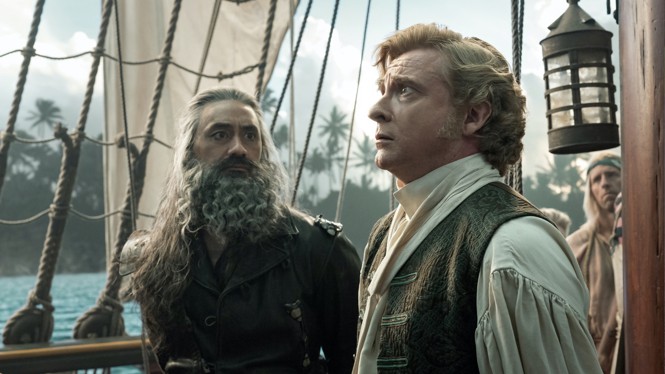
Our Flag Means Death (HBO Max)
If Our Flag Means Death contained only scenes of the 18th-century aristocrat Stede Bonnet (played by Rhys Darby) struggling to become a bloodthirsty pirate with the help of the swashbuckler Blackbeard (Taika Waititi), I would probably still have nominated the series for this list. Darby and Waititi are so hilarious in their roles, I found myself cackling at pretty much every pratfall. But the comedy is much more than one of errors; it’s also a thrilling action-(mis)adventure boasting a murderer’s row of excellent cameos, and a fascinating look at the foibles that come with privilege. Most unpredictably, it’s a heartfelt, slow-burn romance that defies television tropes about queer characters. Our Flag Means Death is rather moving for a series that has a penchant for making characters suffer accidental stabbings. Then again, piracy is all about rule breaking. Subverting every expectation only makes sense. — SL
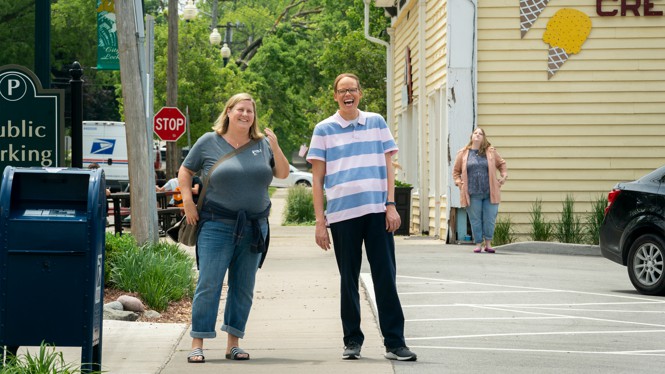
Somebody Somewhere (HBO Max)
In this moment of big TV—epic settings, melodramatic plots—there’s a lot to be said for TV that is small. Somebody Somewhere is small in the best sense: finely observed, subtly written, and acted with such precision that the show can read at times as a documentary. Bridget Everett plays Sam, who has moved back to her childhood home in Kansas to care for, and then grieve, her beloved sister. Sam is a gifted singer and once hoped to turn the talent into a career. Instead, in midlife, she finds herself sleeping on her parents’ couch, working a job she hates, and living a skewed version of that other Kansan’s line: For Sam, there’s no place but home. That may not seem like an appealing premise, but Somebody Somewhere quickly evolves into a story about resilience. Sam’s co-worker Joel (the wonderful Jeff Hiller) invites her to a local church’s unofficial “choir practice.” The group’s participants, many of them queer and all of them sharing a sense of displacement, find a home with one another. Their gatherings are triumphs of small TV. Somebody Somewhere is a show about tenderness, both the hurting and the healing; as Sam finds her place, the show also comes to celebrate that most powerful of emotions: joy. — MG
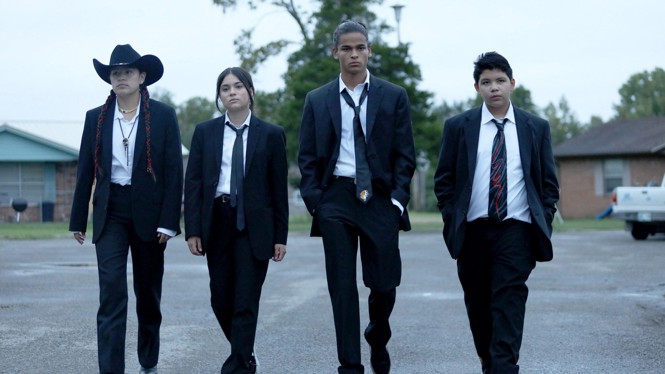
Reservation Dogs (FX on Hulu)
Set in an eastern-Oklahoma community, Reservation Dogs is a riotous comedy filled with rat-a-tat dialogue and mischievous characters, as well as a poignant study of loss. The Native teenagers it follows are friends coming together and apart through the growing pains of adolescence (and at times through ill-advised antics)—an unofficial family bound by heartbreak and struggle. The second season feels even more inventive than the first, liberally blending tones and storytelling styles to offer an expansive yet specific portrait of daily rez life. The show often gets me tearing up while cracking up; even now, thinking of Elora (played by Devery Jacobs) hearing the spirit of her late grandmother greet her by calling her a “shitass” makes me want to smile and cry. Reservation Dogs isn’t special just because it boasts Native talent in front of and behind the camera. It’s special because it feels limitless. — SL
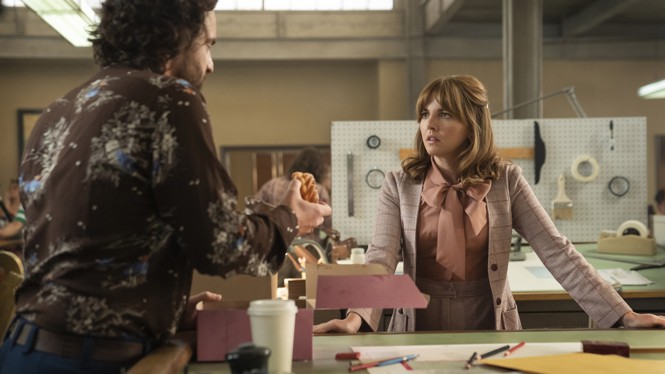
Minx (HBO Max)
I came so late to Minx, truth be told, that it was almost already gone from HBO Max, even though it pertains to basically all of my interests: 1970s-era feminism, the sex wars, magazine publishing, Jake Johnson straddling the line between scuzzbucket and sweetheart with yogic balance. Ellen Rapoport’s half-hour comedy is about an earnest feminist writer, Joyce Prigger (Ophelia Lovibond), whose efforts to launch a new magazine called The Matriarchy Awakens keep landing with a thud—until she meets Doug Renetti (Johnson), a brash pornographer who persuades her to launch the first erotic magazine for women. Minx’s rose-colored view of the 1970s sex industry is funny, modern, and essentially light at heart. (Watch The Deuce if you’re craving a darker, more honest view of things.) But the show also pokes at subjects we’re still hashing out 50 years later: liberation, exploitation, how to sell a cause without selling out. “We’re talking about feminism and pornography, and we’re having a good time,” the TV host Dick Cavett (Erin Gann) says in one episode. I couldn’t agree more. Find Minx a new streamer, stat. — SG
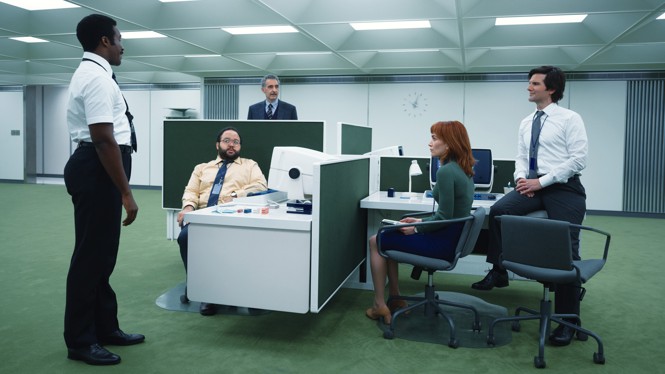
Severance (Apple TV+)
What’s more alarming: waking up in a conference room with no memory of who you are or how you got there, or realizing that Severance is, yes, a show that debuted in 2022? Dan Erickson’s quirky, mind-bending corporate thriller is the definition of a slow burn, and week after week, it became the show people couldn’t stop asking questions about. What’s with all the hallways? Is the melon symbolic? Would severance help my burnout? Can we talk about the goats? Bolstered by a two-faced (in the best way) performance from Adam Scott as Mark S. and a fleet of supporting actors doing brilliantly wacky work (Zach Cherry, Britt Lower, Tramell Tillman, Patricia Arquette, John Turturro, Christopher Walken, Michael Chernus), Severance layers intrigue over surreal set pieces, and ends with a cliffhanger that maddened and thrilled me in equal measure. — SG
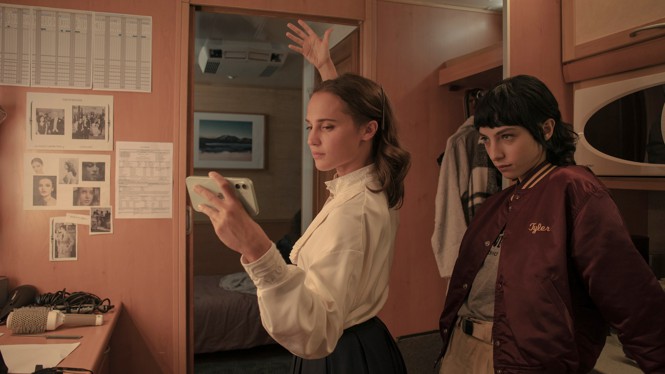
Irma Vep (HBO)
Move aside, Babylon. Try again, Empire of Light. Irma Vep probed the magic of filmmaking first—and did it on the small screen in the giddiest, rowdiest, and most confounding way possible. Set in Paris, Irma Vep is a series about the making of a series called Irma Vep, which itself is based on a 1910s French serial called Les Vampires, as well as a 1996 film adaptation also titled Irma Vep. Got all of that? If not, too bad: The writer-director Olivier Assayas’s eight-episode curio revels in chaos and delights in the absurdity of life behind the scenes. Egos clash, schedules collapse, and movie stars collide into their characters—because that’s what Serious Art needs, or so the drama’s protagonists believe. The show is pretentious yet self-aware. And maybe I’m just a sucker for meta TV (see also: The Rehearsal), but as Irma Vep posits: If all the world’s a stage, why shouldn’t we peek behind the curtain for entertainment? — SL
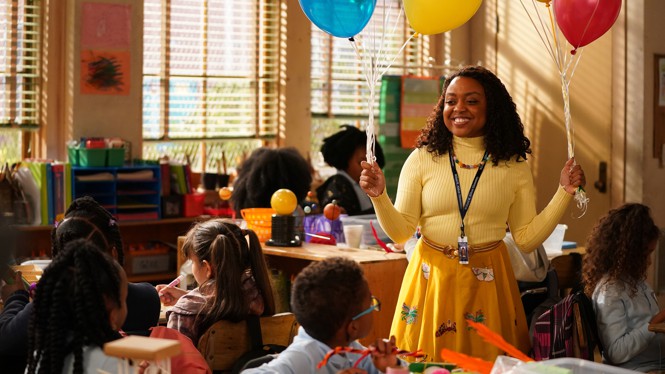
Abbott Elementary (ABC)
Abbott Elementary is in many ways a classic workplace sitcom, akin in structure and vibe to The Office, Parks and Recreation, and Superstore. As with those earlier comedies, a collection of quirky characters—among them Janine (Quinta Brunson), Abbott’s protagonist, a lovable try-hard in the manner of Leslie Knope; Melissa (Lisa Ann Walter), Janine’s fellow second-grade teacher, who talks tough to everyone but the students she loves; and Ava (Janelle James), the school’s primary agent of chaos and, as it happens, its principal—gives the show its heart and appeal. The teachers of Abbott are overworked and underfunded, and the show acknowledges the consequences of both: Kids are shortchanged; educators double as entrepreneurs. But Abbott, like its characters, refuses to cede to hardship. Instead, it is a sitcom through and through, full of physical comedy and wacky absurdities and the camaraderie of a shared profession. “We do this because we’re supposed to,” Melissa tells Janine in one episode. “It’s a calling. You answered.” — MG
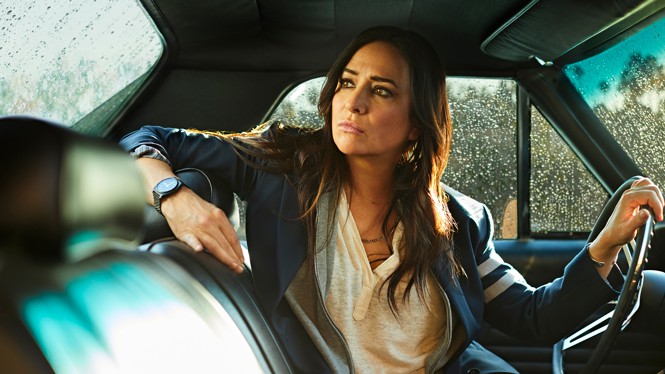
Better Things (FX)
Pamela Adlon’s loosely autobiographical series about an actor navigating single motherhood and creative work in Los Angeles can feel, in any single 24-minute episode, like a tone poem, a sketch show, a travelogue, and an acute satire of the entertainment industry. But more than anything else, it feels like a love letter to single parenthood, and to the people who carry their family even when they’re beyond bearing the weight of it all. In later seasons, Adlon’s idiosyncratic sensibilities gain sharper definition, leading to some of Better Things’ standout moments: a choreographed dance sequence to Christine and the Queens, a hazy few days of music and magic in New Orleans, and the funniest, most poignant Zoom funeral anyone could invent. In the fifth and final season, which aired this year, Adlon’s Sam comes to realize that despite her sniping kids, her stop-and-start career, and her ongoing financial deficiencies, she is truly, meaningfully happy. It is a revelation and moment of grace that few characters on TV have so fully earned. — SG
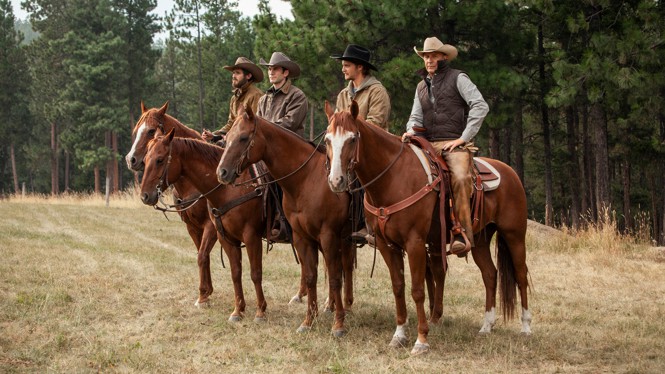
Yellowstone (Paramount)
In an early episode of Taylor Sheridan’s juggernaut, a group of ranch hands is working on a stretch of land in Montana. The cowboys encounter a grizzly. The animal, charging, chases one of them up a tree. As the terrified Jimmy screams for help, the other cowboys take their ropes, make lassos, and toss them, stopping the huge beast in its tracks. Scenes like that—the dudes roped a grizzly—are what help make Yellowstone the most popular show in America: scenic, epic, absurd. Now in its fifth season, the series operates in the tradition of Dallas, and also of The Sopranos and Succession and The Crown. It is the story of John Dutton’s attempts to protect his family’s enormous ranch from those who want to take it, and of the three children who might (or might not) inherit it. Yellowstone is a soap opera above all, reveling in twists and cliffhangers and deus-ex-machina plot resolutions. It is also, however, a layered tale about family and destiny, an insightful examination of all that people pass on to the next generation, and all that they cannot. — MG







